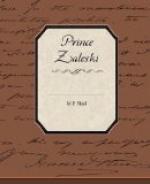’My friend here could tell you, and he would, a fine tale of the immensely important part which jewels in all ages have played in human history, human religions, institutions, ideas. He flourished some five centuries before the Messiah, was a Memphian priest of Amsu, and, as the hieroglyphics on his coffin assure me, a prime favourite with one Queen Amyntas. Beneath these mouldering swaddlings of the grave a great ruby still cherishes its blood-guilty secret on the forefinger of his right hand. Most curious is it to reflect how in all lands, and at all times, precious minerals have been endowed by men with mystic virtues. The Persians, for instance, believed that spinelle and the garnet were harbingers of joy. Have you read the ancient Bishop of Rennes on the subject? Really, I almost think there must be some truth in all this. The instinct of universal man is rarely far at fault. Already you have a semi-comic “gold-cure” for alcoholism, and you have heard of the geophagism of certain African tribes. What if the scientist of the future be destined to discover that the diamond, and it alone, is a specific for cholera, that powdered rubellite cures fever, and the chryso-beryl gout? It would be in exact conformity with what I have hitherto observed of a general trend towards a certain inborn perverseness and whimsicality in Nature.’
Note.—As some proof of the fineness of intuition evidenced by Zaleski, as distinct from his more conspicuous powers of reasoning, I may here state that some years after the occurrence of the tragedy I have recorded above, the skeleton of a man was discovered in the vaults of the Manor-house of Saul. I have not the least doubt that it was the skeleton of Ul-Jabal. The teeth were very prominent. A rotten rope was found loosely knotted round the vertebrae of his neck.
THE S.S.
’Wohlgeborne, gesunde Kinder bringen viel mit....
’Wenn die Natur verabscheut, so spricht sie es laut aus: das Geschoepf, das falsch lebt, wird frueh zerstoert. Unfruchtbarkeit, kuemmerliches Dasein, fruehzeitiges Zerfallen, das sind ihre Flueche, die Kennzeichen ihrer Strenge.’ GOETHE. [Footnote: ’Well-made, healthy children bring much into the world along with them....
’When Nature abhors, she speaks it aloud: the creature that lives with a false life is soon destroyed. Unfruitfulness, painful existence, early destruction, these are her curses, the tokens of her displeasure.’]
[Greek: Argos de andron echaerothae outo, oste oi douloi auton eschon panta ta praegmata, archontes te kai diepontes, es ho epaebaesan hoi ton apolomenon paides.] HERODOTUS. [Footnote: ’And Argos was so depleted of Men (i.e. after the battle with Cleomenes) that the slaves usurped everything—ruling and disposing—until such time as the sons of the slain were grown up.’]




